Feds urged to reject plan to sell troubled Chinatown building for low-income seniors
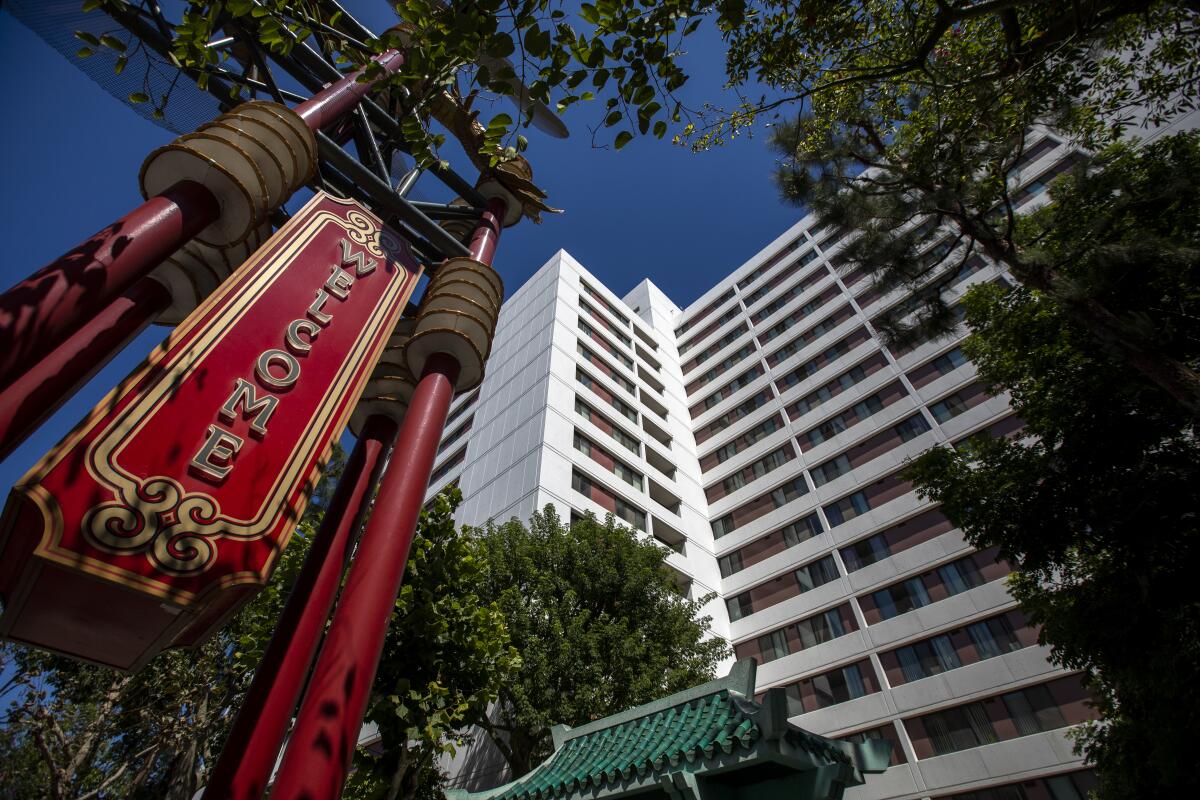
For decades, living conditions at Cathay Manor Apartments have deteriorated as its elderly, low-income residents have grown more isolated amid the rising rents and gentrification of booming Chinatown.
Dingy hallways and run-down communal spaces lead to modest apartments, many of which haven’t been updated in years. Clogged vents blow tepid, foul-smelling air. Malfunctioning elevators have repeatedly gone unfixed for days on end, leaving many of the vulnerable, mostly Chinese American residents marooned on their floors.
The 38-year-old complex on a busy stretch of North Broadway is a far cry from the gleaming luxury towers that have gone up across the neighborhood since the turn of the century. Yet its owners see it as a potential moneymaker.
They hope to sell the federally subsidized housing complex for about $108 million, a high valuation for the area based in part on a massive rent increase that would need to first be approved by the U.S. Department of Housing and Urban Development.

Advocates for the aging residents are raising the alarm over the proposed transaction. They are also voicing concerns about subpar living conditions at Cathay Manor, which benefits from millions of dollars in federal housing subsidies each year and was built for $30 million financed primarily by a 40-year federal loan.
They allege that its owner, the Chinese Committee on Aging Housing Corp., and its chief executive and president, Donald Toy, have neglected the building and its residents. The advocates are urging HUD to block the proposed sale and deny a request by its would-be buyer, a nonprofit called Lutheran Gardens Corp., to raise rents to $2,700 per month, a hike of more than 146%. That increase would be paid by HUD — and therefore by taxpayers — not by residents, who pay only a third of their income for housing under the federal Section 8 program.
There’s nothing wrong with making a profit. But the concern is that allowing the sale of Cathay Manor on the proposed terms would reward its current owners for accepting federal funds for low-income housing while neglecting the property and its residents.
“The finances of the sale do not hold up to scrutiny, and could obligate HUD to commit millions in public resources to bail out a negligent, abusive property owner,” representatives of the Committee of Chinatown Coalition for Cathay Manor wrote in an August memo to HUD officials and members of Congress.
Residents and advocates marched Thursday morning about half a mile from Cathay Manor to HUD’s L.A. field office to protest the proposed sale of the building and rent increase.
Randall Kelly, founding member of East West Advisors, which Lutheran Gardens has hired to consult on the transaction, said in an interview this week that “the request for the $2,700 a month for the contract rents has been taken off the table for now because it’s being revised at HUD’s request.”
But he said a comparably significant increase would be necessary for the purchase to be workable. The added rent revenue would enable Lutheran Gardens to obtain a large enough mortgage to pay for all the repairs, upgrades and other expenditures needed to justify the elevated rents. The proposed new monthly rents are based on an estimate of the amount the units could otherwise fetch on the open market once those improvements are made.
A succession of local and federal politicians has encouraged the federal government to use its influence to ensure Cathay Manor is properly kept up and its residents and federal taxpayers don’t lose out in the proposed plan.
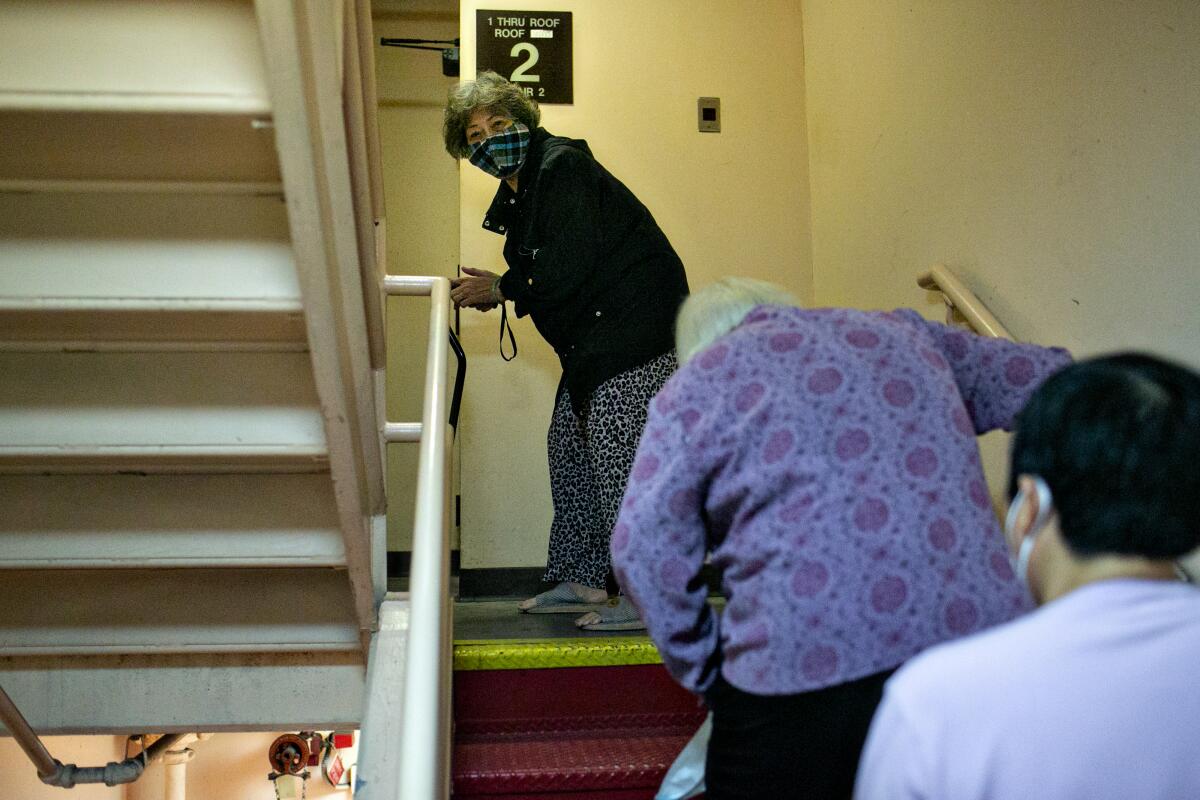
Last October, City Atty. Mike Feuer filed 16 misdemeanor charges against CCOA and Toy for violating fire codes, failing to provide a working elevator, and other alleged crimes associated with the building’s condition.
Earlier this month, U.S. Sens. Dianne Feinstein and Alex Padilla and Rep. Jimmy Gomez, all Democrats, signed a letter to HUD Secretary Marcia Fudge calling on the agency “to work diligently to address the substandard housing conditions at the building and prioritize culturally competent buyers that will provide long-term stability” for its tenants.
HUD must sign off on any proposal to sell the building or raise rents, which it has yet to do.
“HUD is committed to ensuring that the building is maintained in a safe and sanitary condition and that tenants are protected through preservation of affordability use restrictions,” Andra Higgs, a spokesperson for the department, said in a statement. “The tenants’ rent will not exceed 30% of their income, and tenants will not be displaced as a result of any proposed sale.”
Yelena Zeltser, strategic initiatives coordinator for the Southeast Asian Community Alliance, wants the federal agency to go a step further and ensure that any deal for Cathay Manor is based on a realistic assessment of the property’s value.
“In the rent comparability study they submitted to HUD, they grossly overvalue the value of the property. They quote it at $4.18 a square foot, which is higher than market rate apartments nearby that are newly opened with luxury features,” Zeltser said. “We’re saying to HUD that you’ve got to do your due diligence.”
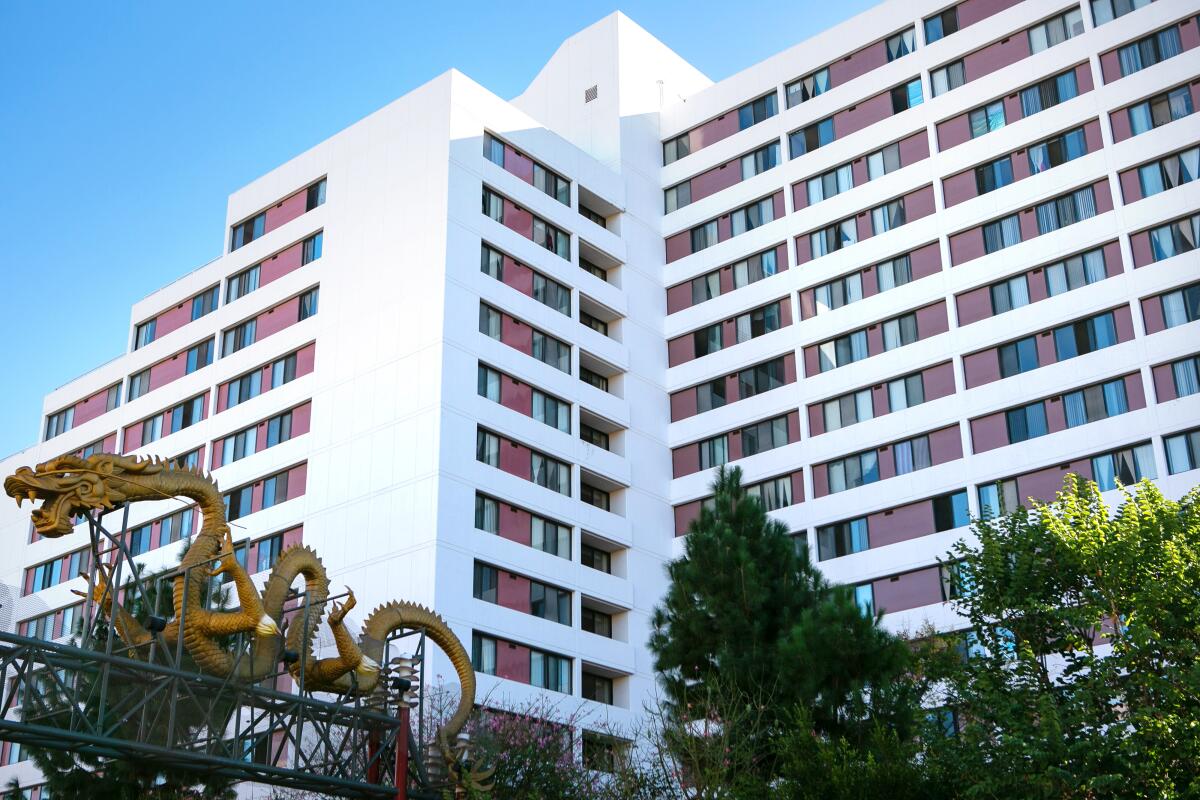
Cathay Manor is an imposing, 270-unit structure at the eastern terminus of the dragon-peaked Chinatown Gateway Monument. The apartment complex was once a beacon to older neighborhood residents hoping to age inexpensively among familiar sights and sounds. The first federally subsidized affordable housing property for seniors in Chinatown, it was billed as a haven for low-income elders when it opened in 1984.
But just four years later, 200 tenants held their first protest over insufficient maintenance.
“I’m surprised because all these things we have resolved, or are in the process of resolving,” Toy told The Times after the 1988 protest.
Once a respected member of L.A.’s Chinese American community, Toy was referred to as “Mr. Chinatown” on the floor of Congress in 1996 by Rep. Xavier Becerra, who went on to praise him for providing hundreds of retired Chinatown seniors with “safe and decent” places to live.
“Cathay Manor … is really a tribute to the success of someone like Don Toy. Cathay Manor is there, and the people living in Cathay Manor owe a great deal to Don Toy,” Becerra, who is now the U.S. secretary of health and human services, said at the time.
Today, 26 years later, Toy faces a list of criminal charges for failing to address the abysmal conditions in his apartment building, which were tallied in more than 300 code violations during a December inspection. Toy did not return calls seeking comment for this article.
Water outages have become a frequent headache, residents of Cathay Manor told The Times in August via an interpreter. A pipe burst there earlier this year, causing water to cascade out into the concrete gutter of Cesar E. Chavez Avenue, which runs along the side of the building. The complex’s two hulking elevators were out of service for weeks last year, they said.
On the first of Cathay Manor’s 16 floors, once-popular community gathering spaces have long sat locked and empty behind streaked glass windows. Most of the few cars in the underground garage are caked in grayish dust, their tires long since deflated by years of disuse.
Residents shared a litany of serious concerns about their living conditions during an August visit and a previous tour chronicled by The Times in January.
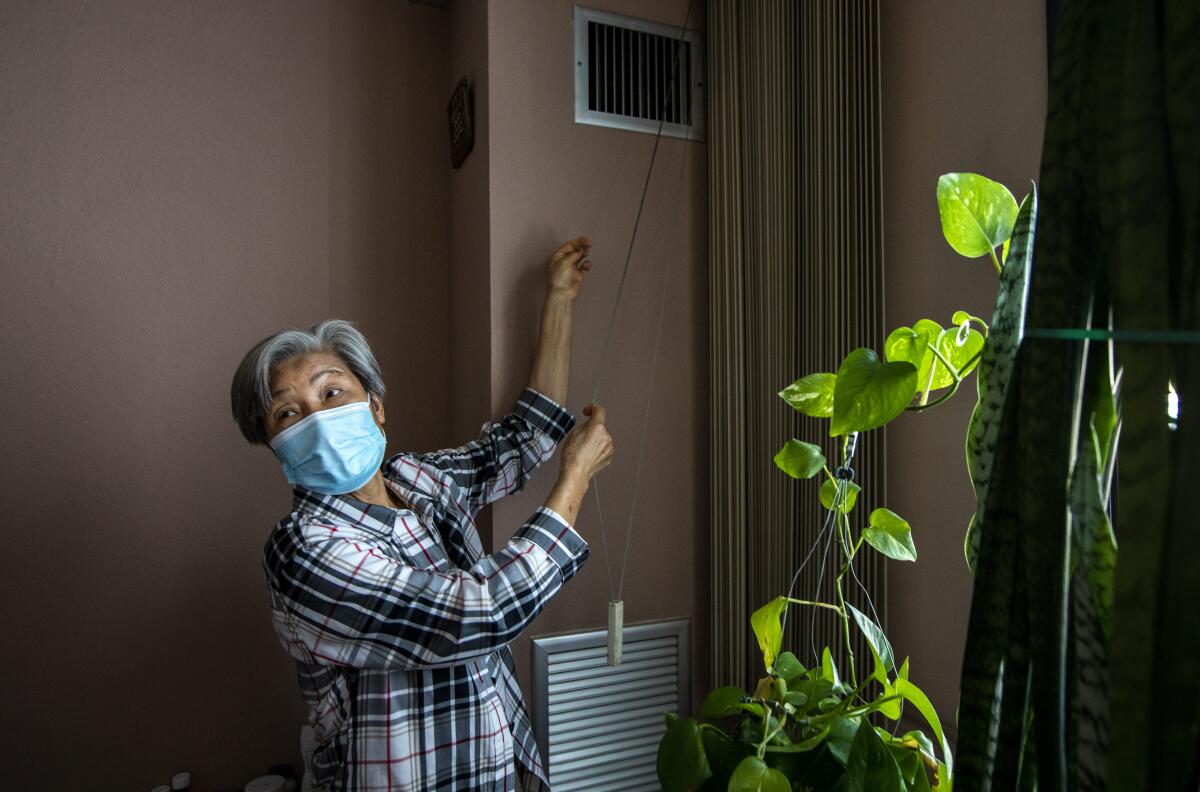
Amy Chun has lived for the last eight of her 75 years in an apartment on Cathy Manor’s fourth floor. Known around the building as “straw hat lady” in a nod to her preferred head covering, the Hong Kong native in August cited ceiling leaks, grimy vents and water outages among many complaints about her apartment.
Pointing down at a couple of plastic tubs on the floor of her shower, she explained that when the laundry room on her floor is closed — not a rare occurrence — residents have to hand-wash their clothes, which can be difficult for people with health conditions or disabilities.
“When I make a request for things to be fixed, they will look at how ‘critical’ it is and sometimes fix it and sometimes they don’t for years,” she said, eyeing a vent cover streaked with black residue. “I’m afraid to touch the vent because it doesn’t seem sanitary. I use a chopstick covered with a cloth [for cleaning] because I’m afraid because dirty dust will come out of it a lot.”
Chun says she pays $128.50 per month in rent, thanks to the Section 8 program, which provides federal subsidies to cover the vast majority of recipients’ rent.
Cathay Manor’s owners want to increase the monthly rent for a one-bedroom there from $1,096 to $2,700, which would be more in keeping with average rents in the area.
Whatever the rent, Chun and other residents say their apartments are nothing like the brand-new and renovated units that command premium rates in buildings visible from many apartment windows at Cathay Manor.
So they consider the proposed rent increase a slap in the face to those who have put up with poor living conditions for years. Why, they ask, should there potentially be a sizable financial benefit for owners who have let hundreds of vulnerable seniors live in degraded conditions for decades?
“I don’t think they should raise the rent, and the rent increase is not reasonable,” Chun said.
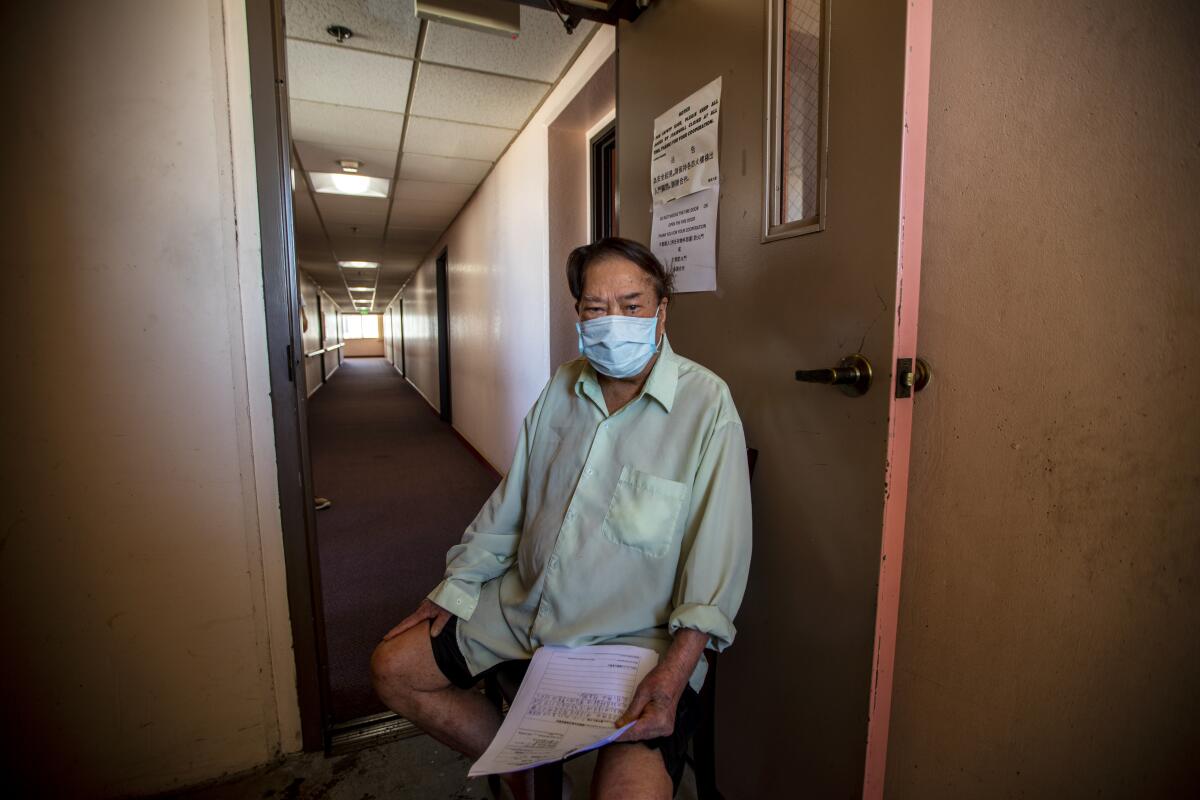
Ne Hung Hom, the 86-year-old head of Cathay Manor’s tenant association, said in an interview just outside the door to his ninth-floor apartment that Barker Management, which cares for the property, doesn’t “care about elderly people or helping us.”
“I have been living here for so many years and they have gotten so many funds and nothing has gotten better,” he said. “They have no qualifications for raising the rent because the building is in such bad repair.”
Asked about such concerns, Kelly said, “Lutheran Gardens has no intention of converting Cathay Manor to luxury units” and that “the plan is to maintain the affordability of the property as it has been.” The nonprofit, he said, intends to sign an agreement to keep the property’s units affordable for decades, adding that “the working number right now” for when the agreement would run through is 2060.
Zeltser says it’s the combination of long-standing neglect, added uncertainty for residents, and potentially substantial financial reward for those who control the property that makes the proposed deal so concerning.
“We want a competent, not corrupt, culturally appropriate and sensitive owner for that building so the seniors who live there are comfortable and stable and so they aren’t on pins and needles all the time,” she said.
“But from what we’ve seen of the deal, it doesn’t seem like they’re focused on maintenance and repairs and that type of thing. It seems like they’re focused more on the building as an asset for them.”
More to Read
Sign up for Essential California
The most important California stories and recommendations in your inbox every morning.
You may occasionally receive promotional content from the Los Angeles Times.











